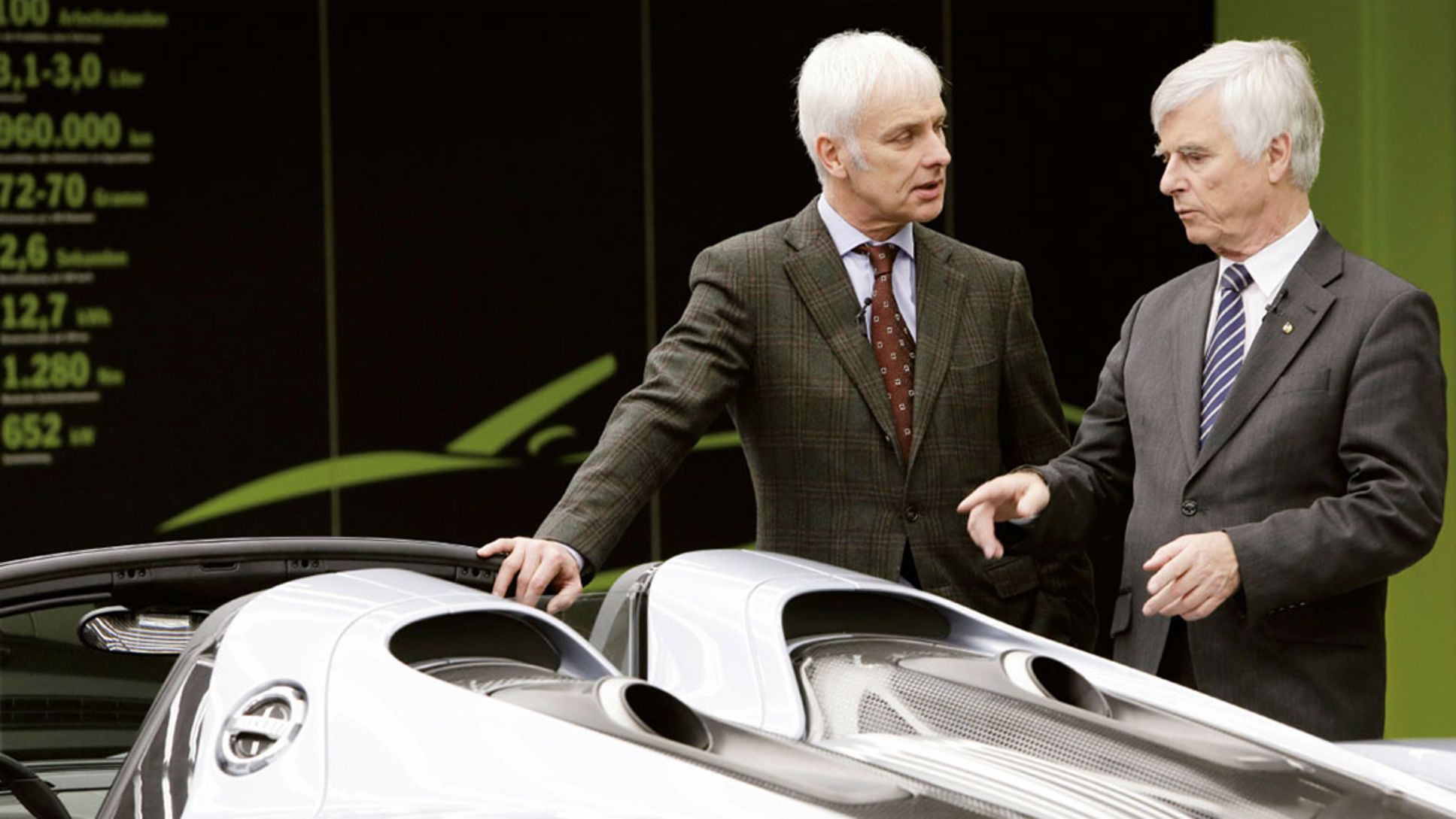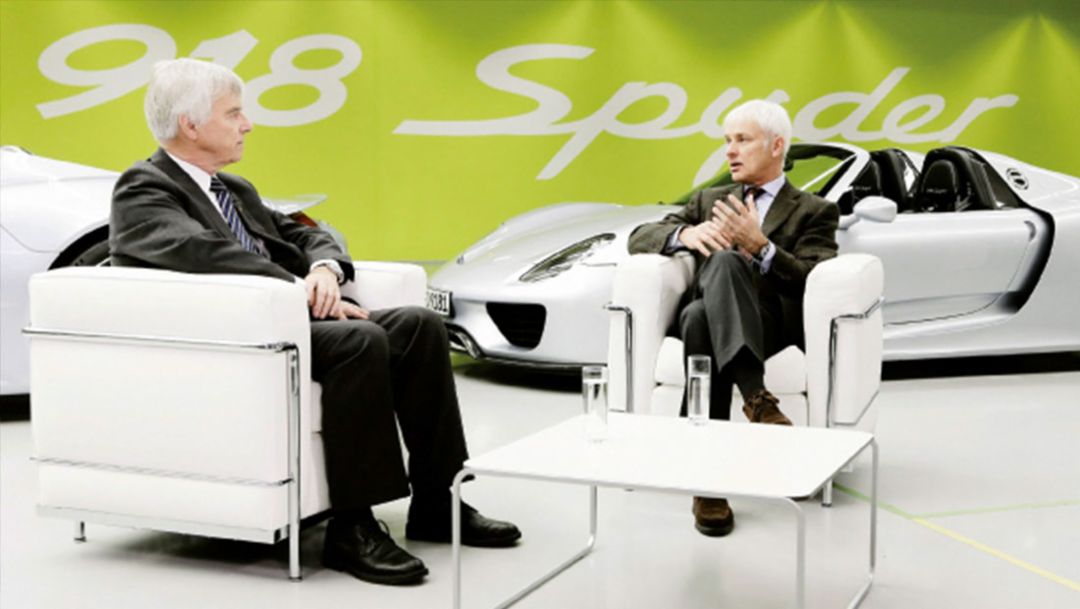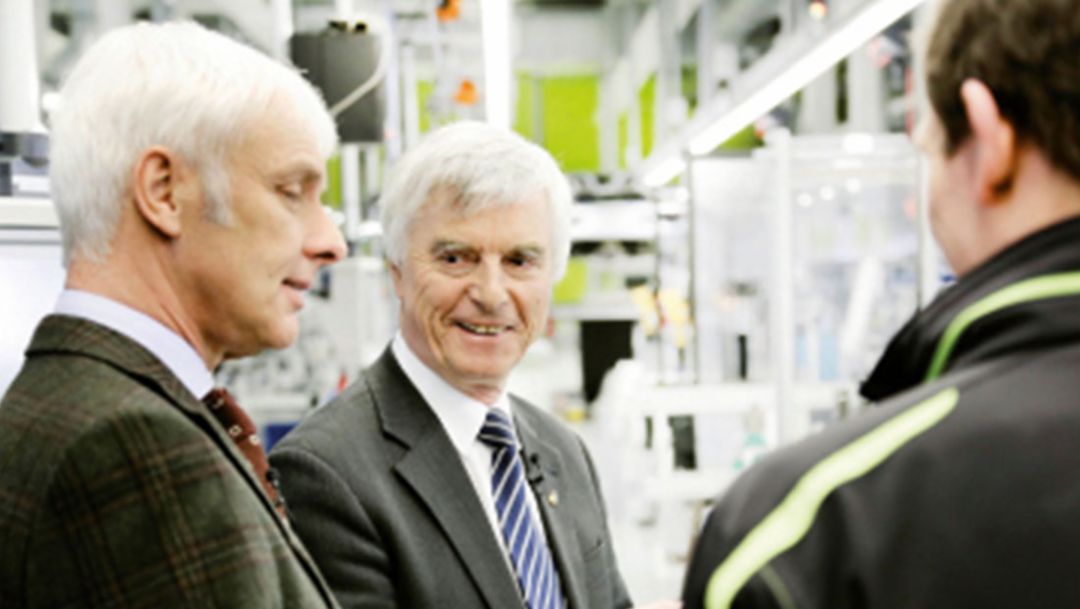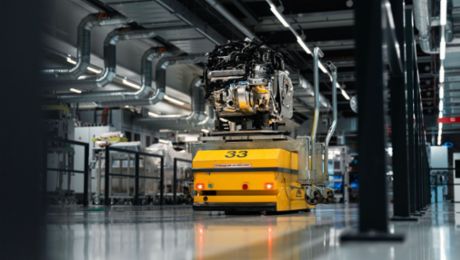Matthias Müller met with Dr. Ulf Merbold at the Zuffenhausen production plant, where the 918 Spyder is being hand-built. The two men share a love for technology and striving for perfect solutions. Both pursued ambitious goals. Ulf Merbold is the only German to have participated in three space missions and although retired now, he is still fascinated by cutting-edge technology. When it comes to space travel, he would love to be on a manned mission to Mars. Matthias Müller shares this passion for realizing great ideas. As the President and CEO of Porsche AG, he is steering the sports car manufacturing company into the dawn of the hybrid drive era. Under his unique leadership, with the 918 Spyder, Porsche is the only car manufacturer to have a super sports car in its portfolio whose high-performance, plug-in hybrid drive combines a combustion engine and electric motor on the rear axle with a second electric motor on the front axle. Its driving performance figures are impressive. It accelerates from zero to 100 km/h in 2.6 seconds, and from zero to 200 km/h in 7.3 seconds. It has a top speed of 345 km/hr (Combined fuel consumption 3.1 – 3.0 l/100 km; CO₂ emission: 72-70 g/km; Electricity consumption 12.7 kWh/100 km).
Merbold: It’s a fascinating sports car – even though it does cost about 800,000 euro.
Müller: The 918 individuals who will one day have this car in their garage appreciate the extraordinary.
Merbold: In all periods of human history, it was the extraordinary that moved humanity forward. Just think about the pioneers of flight. In the history of technology, these visionaries were often deemed to be crazy. However, I say we should leave these creative minds alone to pursue their ideas. My passion is flying. I could do without many things, but not without my glider plane. I can really empathize with the pioneers of the aviation world.
Müller (laughing): Obviously, we’re not crazy, but extremely creative. The 918 Spyder incorporates many technical solutions – treats, if you will – that will be found in upcoming generations of cars. It is a driving force for technology in which we combine maximum performance with minimum fuel consumption. It goes to show that when we came up with our development objectives, we proceeded in a very rational manner. Porsche is currently the most profitable car manufacturer in the world. The only way for us to keep holding this pole position against tough competition is by continually striving to anticipate the future requirements of our customers and to further push the boundaries of what is technically feasible. We don’t just want to be at the top – we want to stay there.
Merbold: I’m not a car expert, but I think that’s what people expect from Porsche. You have to bring a high level commitment to the table to draw the utmost from the opportunities you have available. That is how we also operated during my time working on space missions.
Müller: Naturally, as the technology leader, Porsche cannot be satisfied with anything less than the best. That is why the 918 Spyder incorporates materials such as carbon fiber-reinforced polymers, magnesium, and titanium. In this way, we’re staying true to our traditional role of being a trendsetter in terms of lightweight engineering. The interaction of the two electric motors with the combustion engine requires smart power management given that the system puts out 887 hp (editor's note: *combined fuel consumption 3.1 – 3.0 l/100 km; CO₂ emission: 72-70 g/km; Electricity consumption 12.7 kWh/100 km). Believe me, our development engineers in Weissach put in long hours of hard work to make that control system function perfectly. I consider myself very lucky that we have so many extremely talented engineers on board with us at Porsche.
Merbold: The example you mentioned makes it clear that a highly differentiated society like ours has to rely on diligence and brainpower to stay ahead of the global competition. That is why I’ve pushed for even better equipment in our research facilities for a long time. Over a broad spectrum, we need many good colleges as well as top universities. I’ve noticed that in this realm there has been a positive shift in awareness in regard to support for elite universities over the last few years. However, our government could do a lot more. And last but not least, we need more basic research to be done at leading institutes like the Max Planck Society. Most of the experiments that I performed in space revolved around basic research – in regard to increasing our knowledge in astronomy, atmospheric physics, and material research. By the way, your cars also benefit from our research.
Müller: Really?
Merbold: The ceramic brakes that you offer in your models were originally developed by the German Aerospace Center. This extremely heat-resistant material was first used for the exterior skin on space capsules. The ceramic protective layer prevents the capsules from burning up upon re-entering the atmosphere.
Müller: We’re very pleased when research facilities come up with solutions that our industry can implement in marketable products. We are fully aware of how important it is for the schools, universities, and research institutes to be top-notch so as to benefit the future of our industry. We’re very glad to have excellent universities in our region and that many graduates want to work for us. That is a key benefit of our location. However, it’s also very clear that the demographic trend alone – namely the decreasing number of young people who even want to become engineers or technicians – is a cause for concern for the future of German industry. That is why we are trying to generate interest among young individuals in technology. Our annual Ferry Porsche Prize, for example, aims to promote the best talent in the fields of mathematics and physics among high school graduates in Baden-Württemberg.
Merbold: We should also tap the innovation potential of older individuals more. There’s a lot of knowledge disregarded and left by the wayside.
Müller: You’re right. At Porsche, we support older employees already with our enhanced health care program. We want to keep our colleagues who are over 55 years of age fit and healthy for a longer period. In addition, we are taking measures to ensure a better family-work balance. More of our employees than ever before can organize their respective work-life situations better by means of a customized work schedule. Part of this program also includes setting up day care centers for children. We are also building a new training center that can accommodate more than 500 aspiring professionals. We are in the process of putting together an entire package to offer our male and female employees outstanding opportunities and thereby remain an especially appealing employer.
Merbold: Another important factor to consider is that within Germany, everyone – politicians, managers, teachers – absolutely everyone who has some degree of responsibility in our modern society needs to be aware of the relevance of science and technology for the well-being of future generations. My motto is: more creation and less administration! I know I’ve already said this, but we need to give creative minds free rein. I would like to see a society that sets aside part of its gross national product for exploring new horizons.
Müller: As a company, that’s exactly what we do. In fiscal 2013, Porsche invested more than ever – 1.6 billion euro – in research and development. According to the EU, the Volkswagen Group, which we belong to, is at the top of the rankings of private companies in terms of highest investments in research and development worldwide. By the way, among the top ten are five companies from the US – the Volkswagen Group is the only one from the EU.
Merbold: I’m also speaking about structural conditions. I’m most interested in future industries as a whole, but naturally space flight in particular. The federal budget has allocated a minuscule amount of funding for space flight. If we don’t get more government support here, we will be relegated to be spectators instead of actors of future Mars missions, and then we will have to buy tickets to space from Russia or China. I’m convinced that you can name quite a few examples in the automotive industry where you wish there was more funding.
Müller: There are good examples where we definitely would like to see some kind of government commitment to provide startup funding for new technologies. I will mention one instance in regard to the emerging electromobility trend. The German government is pursuing the goal of putting one million electrically powered cars on the road by 2020. Now I’m asking you: where are all those e-cars supposed to get charged up? Without an extensive network of charging stations, we will hardly be able to achieve that objective. So an infrastructure program could be helpful here. But I think that we need to take this topic up to a higher political nlevel.
Merbold: Do you mean the EU in Brussels?
Müller: A few politicians in Brussels haven’t understood yet to what extent our future standard of living depends on the well-being of the European industry. Granted, the EU has an objective to increase industry’s contribution to GDP from 16 percent currently to 20 percent by 2020. But aside from Germany, the Netherlands, Austria, and Poland, the value added by industry is on the decline in EU countries. This even includes the large economies of France and the UK, which have not yet been able to stop the de-industrialization process.
Merbold: What really bothers me is the fact that the EU wants to spend more than 380 billion euro in agricultural subsidies by 2020. Wouldn’t it be smarter if we looked to the future and spent the money on industry?
Müller: For our sector, I would claim that the automobile industry is a key industry and an extremely important economic factor for Europe. I’m not just referring to the millions of jobs it creates. In Germany, the automobile industry is the number one driver of innovation. In fact, no other industry sector submits as many patents. And through the orders that it gives to suppliers, the automobile industry is a major driving force for other segments like electronics and information technology. Just think about the electrification of motors and the connectivity of vehicles among each other or with the internet. Those are tremendous future challanges which we have not yet faced in their full scope.
Merbold: Many years ago, the Apollo program in the US was one of those driving forces. After the Sputnik mission caught the US by surprise, triggered in 1961 by the first manned space flight by the Russian Yuri Gagarin, the Americans put billions of dollars into this program. This spurred the entire computer industry, and thus even laid the foundation for Silicon Valley. Transistors and diodes were decreased in size tremendously in the sixties and made the moon missions possible. The previous computer generation consisted of huge, heavy cabinets that were bona fide energy gluttons. The money that the US invested in the Apollo program back then was paid back three-fold in the following decade through tax revenues from the sale of new industrial computers. When we see what kind of inspiration such a program can elicit, that should give us some encouragement.
Müller: In any case, it did show the whole world what is possible when politics and industry pull together in the same direction. Of course, I’m not saying that the EU has to immediately set up an Apollo program. But when you take a look at the efforts China is making to set up new industries, or you consider that Korea, Japan, Scandinavia, and others are taking research funding much more seriously than we are, or that funding approvals take much longer in Germany than in the US, then your comment earlier is right on the mark. Our policies should encourage us towards creation, not administration.
Info
Text first published in the 2013 Porsche AG annual report





